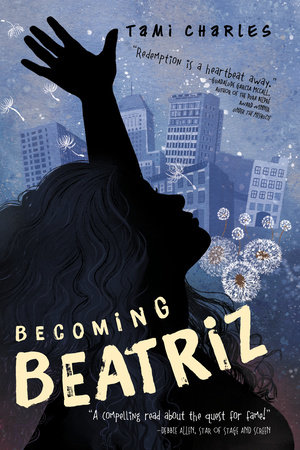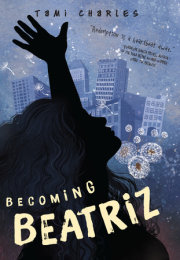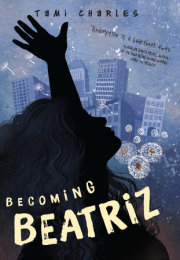Friday, April Thirteenth They say when you see a wishmaker flower, you’re supposed to make a wish and blow.
I thrust my body to the ground, press my face to the pavement, and wish away the first gunshot and the panicked faces and screaming voices circling around my ’hood. The wishmaker juts out of a gap in the sidewalk—pays me no attention. Instead it searches the sky for the sun and leaves me realizing this shit’s all my fault. I should’ve let Junito be.
Crack! The second shot rings out louder than the first. I still hear the radio from the bodega blasting Héctor Lavoe and Willie Colón’s “Todo tiene su final.” A minute ago, I’d begged Junito to dance salsa with me. Ignored his warnings to stay in the house today. Pulled him into the rhythm and lost myself in the lyrics—everything has an end.
Ain’t this some bull.
Crack! Crack! More bullets soar above us, shattering the window of our bodega. Shards of glass land on me. I pant through heavy breath and squinted eyes, screaming my brother’s name. I turn my head and see Junito reach for the Glock in his boot. He aims it at the silver Trans Am and pops off a couple rounds.
It’s not cold out, but I shiver. Questions fill me up faster than bullets slice the air. Who ordered this hit? Why does God hate me? Because that’s the only explanation I got for him making my birthdate and death date one in the same.
And who made up that stupid wishmaker flower saying anyway? Because whoever did can kiss my nalgas. Twice.
The silver Trans Am comes to a screeching halt in front of the bodega.
More shots.
Who are they? What do they want?
Junito jolts upright, glass falling off of him, and fires off again. I stay on the ground, my chest heaving in and out, tiny pieces of asphalt piercing my cheek.
But then tires skid and smoke against the asphalt before accelerating down Broadway. Just like it happens in the movies. This is the magic of Junito Mendez. No matter what, he always forces the bad guys away. I’d seen it before—but not like this, not this bad, not this close to home.
DQ yells out from the bodega, “We’re good in here!”
“Todo bien!” Mami cries out, but I can hear the lie in her voice. On the surface, we’re fine. Just a busted store window and some penny-candy buckets with fresh bullet holes. Look a little deeper, though, and you’d see the truth.
Junito stands up and flashes DQ a knowing look. Then, he starts to run down the alley toward to the empty lots. And even though he told me to stay inside earlier, I follow him. Listening is not my thing apparently. The farther I run, the quieter the music gets.
“Don’t worry. They’re gone.” I can barely get the words out from trying to keep up.
Junito whips his head around fast, the anger in his eyes stabbing right through me.
“What are you doing? I told you to stay back!” His voice is untamed.
“Why didn’t
you stay?” My voice matches his now.
We finally stop running and tuck ourselves against the brick wall of the abandoned alley, positioned between two buildings.
“I don’t need to be on the scene when the police show up, that’s why. Por dios, you don’t listen!” Junito pulls two loose bricks from the bottom of the wall, wipes the Glock clean, and tries to hide it in the empty space. He can't make it fit.
In the distance, I hear the faint sound of sirens, see Junito frantically searching his pockets.
“¡Carajo!” he curses.
“Why were they coming for you, Junito? Tell me right now!” I demand.
In the past, we’ve had one, maybe two gangs outside of Newark try to claim our spot. Never worked though. Junito was a force like that. Either you bowed down or you caught the heat.
Junito finds the switchblade in his boot and starts pounding out another brick like mad. “Not today, Beatriz. All you gotta know is I ain’t letting nobody take over what I built. And sometimes you gotta send a message to let people know that.”
Translation: Something went down last night and Junito started a war.
“Oh yeah? And if these pendejos don’t back down like the others? What then?” My voice loses its balance.
Junito finally gets the brick loose and jams the gun inside. “You ain’t gotta worry about that.”
He wraps his arm around my shoulder and pulls me in real slow. Together, we take turns breathing. Inhala, exhala. Just like Mami always says to calm us down. “Let’s wait a couple more minutes before we go back, and when five-o start asking questions, let me do the talking,” Junito says. “Everything will be fine.”
I want to believe Junito. That it’ll be okay.
“Let’s talk about something else,” Junito insists.
I lift my face to the midmorning sky, picture myself flying through those clouds. “You ever wonder what you could be outside of this place?”
Junito fixes his eyes real hard on the ground. I know this ain’t no kind of life for us. He knows it too. But what choice do we have? Go back to being dirt poor, like we were when we first got here? Or worse, return to Aguadilla? Even if I wanted us to go back to the island, I already know what his answer would be.
Hell no. There’s a monster waiting for us there. “I’d start fresh . . . in San Francisco.” Junito hesitates before he says the last part.
I feel a sharp twinge in my stomach. Because deep down I know who he would go there for. The infamous TJ Martin.
“Anyway, that ain’t possible right now.” Junito adds the switchblade to the hole and slips the first brick in.
A familiar voice creeps inside my head. The one that repeats over and over again that I’m the reason Junito can’t live the way he wants. But I won’t carry that load all by myself. Papi’s the first to blame. Then me. And the Diablos.
I look at my watch. The tick of each second feels like an eternity. I’d spent the morning practicing the dance for my quinceañera and then dodging bullets. Tonight I would have to pretend that none of this ever happened.
“There’s gonna come a day when we won’t have to do this no more, Junito. One day I’ll be a professional dancer and make enough money to buy Mami one of those big houses over in Vailsburg or Mount Vernon. Maybe even away from Jersey.” I face him square on.
But Junito laughs, pointing the second brick my way. “What I tell you about watching that stupid show Fame? That’s television, pipe-dream stuff. This is reality.”
Anger builds up inside. “Whatever, Junito!”
“When you live in a city where cocaine is king, dancing ain’t gonna pay the bills.” He crawls to the edge of the building and takes a peek down the alley.
Junito doesn’t know what he’s talking about. Right there in the midst of the abandoned buildings tagged with my first graffiti—
Fame, I’m gonna live forever—in the empty field where my dancing dreams once bloomed, I envision a life far away from this place.
I don’t notice there’s someone behind me. Only hear the click of a gun and feel the hot metal kissing the back of my head.
“Looks like we get a two-for-one today.” His accent sounds like he’s from Nigeria or something, mixed with French too.
I suck in air, turn around, and see a yellow-scarfed face and two eyes, burning like a distant sun.
Junito springs up. His legs take flight, arms like wings, he throws the brick in his hand at homeboy, knocking the gun out of his hand. The sickening sounds of cracked noses and hard blows to the gut ring over and over. Junito bobs to the right, the dude weaves to the left. And there I sit, star-ing at the dude’s gun a few feet away from me and Junito’s neatly tucked in the wall. Hypnotized by the sounds and the fiery eyes in them both, an inner voice cries out:
Get the hell up, Beatriz. Grab a gun. Any gun. My wrist turns limp as I dig into the hole, wrap my fingers around the trigger, and rise up to finish him off.
Before I can do anything, homeboy gives me a swift punch to my right cheek, the gun tumbling out of my hand. The crunch of my jawbone is like a bomb going off inside of me. The whole universe spinning, and I pull out the blade I keep hidden inside my left cheek.
Homeboy comes in for the double hit, his fist like heavy metal against my face.
My hand slips, and the blade slices through the guy’s bandana not even a full inch. He screams as the bandana falls to the ground, revealing a thick goatee and a holy cross symbol tattooed on his neck. A single red drop of blood dances through his beard and lands on his shirt.
“Oh, you messed up now,” he says, grasping a chunk of my hair in his oversized hands. Junito flies in for an uppercut, but instead catches a foot to the gut that sends him airborne. I punch and punch at the air, at this messed-up life, and at homeboy until I’m out of breath. But he just lifts me from the ground and throws me headfirst against the Dumpster. My back arches in slow motion until it crashes against the asphalt. I lie there, unmoving. He stomps his foot against my jaw again, and my whole world goes black.
Behind closed eyes, I can hear the sound of my heart-beat pulsing through my head, feel the release of his foot. Hear the pounding, blow by blow, as Junito continues the fight.
He’ll get to his gun, or even homeboy’s, and finish the job. Three years as a Diabla and my body count is still zero. I’ve never even touched a gun until now. The small blade hidden in my mouth has always been my only weapon. And Junito wants to keep it that way.
Any second now and this will be all over. Junito and I will run home and put on the biggest show for the police.
Officer: Where were you during the drive-by, young man?
Junito: Officer, my sister and I were taking a stroll in the neighborhood. We weren’t even here. I’ll get ready for my quinceañera, because turning fifteen is a big deal. Go with Mami to pick up Abuela from the airport. Let them both have their way with me. Do my hair, fluff my dress, all that proper “señorita” nonsense. That’ll make Mami happy. I mean, the woman sold her other bodegas to pull off this expensive-behind, wannabe wedding.
A single shot rings out. The blast courses through my entire body, seems to echo all throughout Grafton and Broadway like an explosion thundering in the sky. I can’t move. It’s like someone presses pause on the entire city of Newark. The music, the sirens, the cars—they all disappear.
But when the darkness of my mind clears, and I open my eyes, it’s Junito who I see lying on the ground, shaking uncontrollably, hands pressed against his chest—blood erupting like a busted fire hydrant in the dead of July. I beg my legs to move, to get up and push me toward Junito, but homeboy’s not done with me. He locks his rock-hard boot on my shoulder, points the gun at the space between my eyes. I lie there helpless, thunder moving through me as I watch Junito bleed and bleed.
“This is for Gaston. Got that, muchacha?” He leans down into my face and the heat of his breath finds its way to my skin.
Confusion floods in, wild and unforgiving.
Who the hell is Gaston? “Just hurry up and get it over with.” He’s going to shoot me too. Keep my eyes on the clouds. God’s up there, waiting for me. Even though I’m pissed at him right now. I count down the seconds until I see the white light:
Five . . . four . . . three . . . Before I can reach two, homeboy leans down again and puts his lips close enough to brush against my earlobe. Drops of his blood fall on my shoulder. He whispers: “Nou pap janm bliye!”
What did he just say? I hear a car and turn my head. At the end of the alley, the silver Trans Am screeches to a halt, and the passenger door flies open.
He releases his foothold, grabs his bandana off the ground, and runs away, with his gun in his right hand and Junito’s in his left. When he gets to the car, he does the strangest thing. He turns around, flails his arms out like wings, takes a bow, and yells out, “You talk? We’ll be back.”
I lock eyes with the person driving the car. Study the image from a distance. It’s a girl. Dark sunglasses cover her eyes. Mounds and mounds of blonde dreadlocks spill out from her bandana. Another yellow bandana covers her mouth. She pulls it down, puckers her fire-red lips, and blows a kiss. Homeboy hops in, and they speed off under a sun-filled sky.
My legs finally give me permission to move. I roll over, grab my stomach, and vomit what feels like everything I’ve ever eaten for the past fifteen years.
“Get up, Junito!” It hurts to say each word. I wipe the blood from my mouth with the sleeve of my shirt and run toward my brother.
“¡Ayúdenlo!” I scream, but my jaw is locking.
The sirens grow louder, closer. I press a hand hard on Junito’s chest, begging him to hold on just a little longer.
“They’re coming. I hear them.” More pain fires up in my jaw.
“I’ll . . . be . . . okay. Don’t . . . leave . . . Diablos. . . .” I cover his lips before he can finish his sentence.
“Diabla for life!” I’m sobbing now. “Te lo juro.”
Junito stops shaking, and I scream, “Don’t leave me!” over and over again. Out of nowhere, the cops come running down the alley, guns drawn, mouths moving in slow motion.
My ears become soundproof. All I see is them gesturing for me to lie on the ground. Like a dog. Hands behind my head. Feet together. Don’t move. Be still. But I move uncontrollably. One cop jumps on top of me. Then another. I can’t breathe. Half my face is pressed into the grass. I wonder if Junito’s gone already. If he sees the white light, like I do, coming down from the sky. Then I feel more hands. Damn near fifty of them, exploring my body, searching for something, anything, to connect the dots. My lips position themselves to speak. One final crack in my jaw kills all of my words.
“We need to check the kid’s pulse!” someone yells.
Yes, save him please! Hurry! I plead inside my head.
Someone tosses me on a gurney. Places two fingers on my wrist and starts counting. Slaps a mask on my face. Rolls me toward a flashing swirl of red, white, and blue. Doors shut. Engine roars. Tires screech. Last thing I see out the back window is Junito lying in the field like some kind of science project.
Copyright © 2019 by Tami Charles (Author). All rights reserved. No part of this excerpt may be reproduced or reprinted without permission in writing from the publisher.









